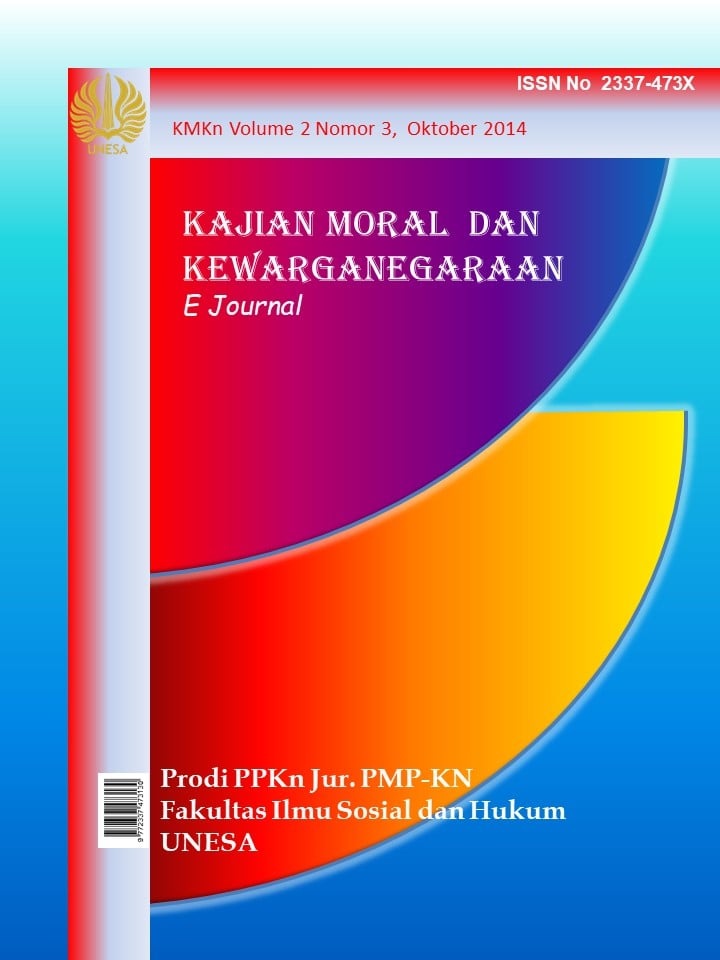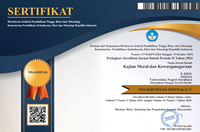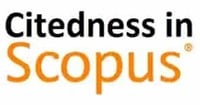PERAN PENDAMPING DAN KETUA KELOMPOK DALAM PEMANFAATAN DANA PENDIDIKAN PROGRAM KELUARGA HARAPAN (PKH) DI DESA TALOK KECAMATAN DLANGGU KABUPATEN MOJOKERTO
DOI:
https://doi.org/10.26740/kmkn.v3n2.p753-768Abstract
Program Keluarga Harapan (PKH) merupakan salah satu upaya pemerintah dalam menanggulangi masalah kemiskinan yang berimbas pada ketidakmampuan dalam pemenuhan biaya pendidikan. PKH memberikan bantuan tunai kepada Rumah Tangga Sangat Miskin (RTSM).Sebagai imbalannya RTSM diwajibkan memenuhi persyaratan yang terkait dengan upaya peningkatan kualitas sumber daya manusia (SDM), yaitu pendidikan dan kesehatan. Penelitian ini bertujuan untuk mengetahui keefektifan penggunaan dana pendidikan Program Keluarga Harapan dalam meningkatkan angka partisipasi sekolah RTSM dan mengurangi angka pekerja anak dibawah umur (6-15 tahun) serta mengetahui lebih dalam peran pendamping dan ketua kelompok dalam pemanfaatan dana Pendidikan Program Keluarga Harapan di Desa Talok Kecamatan Dlanggu, Kabupaten Mojokerto. Jenis penelitian ini adalah deskriptif. Teknik pengumpulan data melalui angket, wawancara, dan dokumentasi. Teknik analisis data yang digunakan dalam penelitian ini adalah deskriptif kuantitatif dalam bentuk prosentase. Program Keluarga Harapan dianalisis merujuk pada pendapat tokoh tentang implementasi kebijakan publik. Dalam menyelesaikan permasalahan yang berkembang dimasyarakat Indonesia diperlukan suatu kebijakan sebagai realisasi dari fungsi dan tugas Negara serta dalam rangka mencapai tujuan pembangunan. Untuk itu dibutuhkan bukan hanya perumusan (rencana) program, tetapi juga implementasi program guna mencapai tujuan yang telah direncanakan. Pada kebijakan Program Keluarga Harapan dapat terimplementasi dengan baik diperlukan syarat-syarat yaitu kondisi eksternal (sikap masyarakat), adanya hubungan kausalitas, hubungan saling ketergantungan kecil, pemahaman terhadap tujuan, adanya tugas-tugas yang jelas dalam urutan waktu yang tepat, komunikasi dan koordinasi yang baik.Kata kunci: Pemanfaatan, Dana PKH
Abstract
Hope Family Program (HFP) is one of the government's efforts in tackling the problem of poverty which gives impact on the inability to fulfill the educational costs. HFP provides cash aid to Very Poor Households (VPH). In return the households are required to meet the requirements related to improving the quality of human resources (HR), namely education and health. This study aims to investigate the effectiveness of the use of Hope Family Program (HFP) education funds in increasing school enrollments of VPH and reduce the number of child laborers under age (6-15 years) as well as insights into the role of mentor and team leader in the utilization of Hope Family Program Education funds in the Talok Village Dlanggu district, Mojokerto. This is descriptive research. The technique of collecting data is through questionnaire, interview, and documentation. Data analysis techniques used in this research is descriptive quantitative in percentage. HFP analyzed referring to the opinion of figure on the implementation of public policy. In solving the problem which is spreading in Indonesian community, it is needed a policy as a realization of the functions and duties of the State and in order to achieve development goals. As a consequence, it requires not only the formulation of (plan) program, but also the implementation of the program in order to achieve the planned objectives. At HFP policy can be implemented correctly through the terms required that is external condition (the attitude of society), the existence of a causal relationship, a relationship of interdependence which is small, an understanding of the purpose, the existence of clear tasks in the proper time sequence, good communication and coordination.
Keywords: Utilization, FHP Fund.
Downloads
Download data is not yet available.
Downloads
Published
2014-08-25
How to Cite
FITRIANINGRUM, D., & Suyanto, T. (2014). PERAN PENDAMPING DAN KETUA KELOMPOK DALAM PEMANFAATAN DANA PENDIDIKAN PROGRAM KELUARGA HARAPAN (PKH) DI DESA TALOK KECAMATAN DLANGGU KABUPATEN MOJOKERTO. Kajian Moral Dan Kewarganegaraan, 2(3), 753–768. https://doi.org/10.26740/kmkn.v3n2.p753-768
Issue
Section
Articles
 Abstract views: 607
,
Abstract views: 607
, PDF Downloads: 327
PDF Downloads: 327





